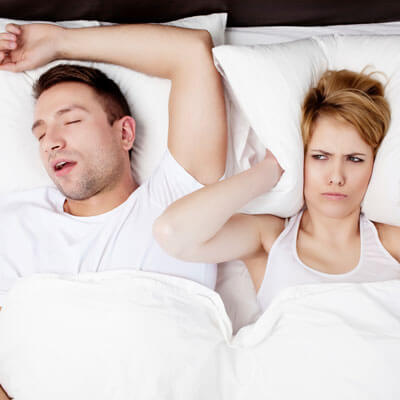Snoring and Sleep Apnoea Therapy
A healthy smile is a reflection of a healthy body. At Go Dental Surgery, Maddington families have been entrusting their oral health to our mother-daughter dental team for over 40 years. We believe that it’s vital to screen for underlying conditions that can impact your dental and overall health. Did you know that our dentists can assess your bite for signs of sleep apnoea, TMJ disorder or grinding (bruxism)?
Sleep Disorders
 Sleep Apnoea is a common and potentially dangerous sleep disorder. There are three types:
Sleep Apnoea is a common and potentially dangerous sleep disorder. There are three types:
- Obstructive sleep apnoea – This type is the more common form, and it occurs when the throat muscles relax.
- Central sleep apnoea – This form occurs when the brain doesn’t transmit proper signals to the muscles that control breathing.
- Complex sleep apnoea syndrome – Also referred to as treatment-emergent central sleep apnea, this type occurs when a person has both obstructive sleep apnoea and central sleep apnoea.
What Are the Symptoms?
The signs and symptoms of obstructive and central sleep apnoeas intersect, sometimes making it difficult to establish which type you have. The following are some of the most typical signs and symptoms that those with obstructive and central sleep apnoea exhibit:
- Loud snoring
- Periods in which you stop breathing during sleep
- Gasping for air during sleep
- Waking up with a dry mouth
- A morning headache
- Difficulty staying asleep (insomnia)
- Excessive daytime sleepiness (hypersomnia)
- Trouble paying attention while awake
- Irritability
The Evaluation Process
During your evaluation, we will assess your oral anatomy for signs of airway resistance and sleep apnoea. This screening can include observation of positioning of the tongue and whether or not you grind your teeth (a symptom of sleeping disorders).
If red flags are identified, we will bring them to your attention and have you complete a sleep questionnaire. An appropriate medical referral will be made if further investigation is needed. In certain cases, a sleep study may also be necessary.
Depending on the underlying causes of your sleep apnoea, TMJ disorder or clenching, an oral appliance may be recommended. These customised devices alleviate the stressors that are influencing your condition.
Frequently Asked Questions
Are there any health risks associated with sleep apnoea?
Does drinking alcohol contribute to sleep apnoea?
Does losing weight help reduce sleep apnoea?
Should I adjust my sleeping position?
Want to Learn More?
For more information or to consult with one of our dentists, contact Go Dental Surgery today. We will be happy to answer any questions that you may have. Most insurance plans are welcome, plus we are open on weekends!
CONTACT US
*Any invasive or surgical procedure may carry risks. Before moving forward, it is recommended that you seek a second opinion from an appropriately licensed medical professional.

